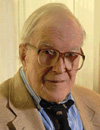New SPIE Biomedical Optics Award to Honor Britton Chance
A world leader and pioneer in biomedical optics, Britton Chance was 97 when he died in November 2010.
 SPIE has created a new award for biomedical optics honoring SPIE Fellow Britton Chance, who died in November at the age of 97. The first Britton Chance Biomedical Optics Award will be presented at SPIE Photonics West in 2012.
SPIE has created a new award for biomedical optics honoring SPIE Fellow Britton Chance, who died in November at the age of 97. The first Britton Chance Biomedical Optics Award will be presented at SPIE Photonics West in 2012.
The award will be presented annually to recognize outstanding contributions to the field of biomedical optics through the development of innovative, high-impact biophotonic technologies. In particular, the award will acknowledge pioneering contributions to biophotonic methods and devices that have significant promise to accelerate or have already facilitated new discoveries in biology or medicine. The award will target achievements that span disciplines and may include elements of basic research, technology development, and clinical translation.
“Brit Chance’s research, training, and leadership have helped fuel the growth of biomedical optics and biophotonics throughout the world,” says SPIE Fellow Bruce Tromberg, director of the Beckman Laser Institute at the University of California, Irvine, and a longtime colleague of Chance.
“His lifelong passion for measuring and understanding physiology and metabolism using light has inspired our community for decades. More than any other individual, Brit brought together people and ideas that spanned across disciplines, creating a special spirit of creativity, innovation, and enthusiasm that has characterized the field of biomedical optics,” Tromberg says.
As a pioneer in the field of biomedical optics, Chance made important contributions in a number of areas. He helped in the identification and functioning of enzyme-substrate compounds and made advancements in breast cancer diagnostics, rf electronics, spectroscopy as a noninvasive analytical tool for clinical diagnosis, and radar.
Chance was the Eldridge Reeves Johnson Professor Emeritus of Biochemistry and Biophysics, and Professor Emeritus of Physical Chemistry and Radiological Physics at the School of Medicine of the University of Pennsylvania. He obtained two PhDs, one in physical chemistry at Penn in 1940 and one in biology/physiology at Cambridge University in 1942.
He became a member of the Penn faculty in 1941 when he was appointed assistant professor of Biophysics and Physical Biochemistry in the School of Medicine.
Chance co-edited the SPIE Press book Medical Optical Tomography: Functional Imaging and Monitoring and had been an editor of the SPIE Journal of Biomedical Optics since its founding in 1996.
With a broad range of interests and unflagging energy, Chance developed an imaging technique to detect breast cancer and helped lay the groundwork for magnetic resonance imaging of humans.
He was the recipient of the SPIE President's Award (2006); a National Medal of Science (1974); a Gold Medal in sailing in the 1952 Olympics; and a U.S. President's Certificate of Merit (1950) for his sensitive work developing and enhancing radar during World War II. He was elected to the U.S. National Academy of Science as well as international academies such as The Royal Society of London and the Royal Swedish Academy of Sciences.
He remained an active researcher despite "retiring" from Penn in 1983, publishing several papers in 2010 and receiving continuous funding for 70 years. Even in his late 80s and early 90s, Chance could be spotted riding his bicycle on the Penn campus, arriving at his laboratory in the early morning. For him, "emeritus" certainly did not mean inactive.
He once told The Philadelphia Inquirer: "Retire? Why would I do that? I enjoy research and I work with a wonderful crew. I like the excitement of new discoveries, moving ahead, finding out new things."
In fact, after he "retired," he launched a new set of research initiatives in biological imaging including the creation of optical diagnostics, now a burgeoning field at the interface of basic science, technical development, and clinical application.
A tribute to Chance by Tromberg and Arjun Yodh will be presented at the BiOS Hot Topics session during SPIE Photonics West in San Francisco 22 January.
SPIE presents several yearly awards that recognize outstanding individual and team technical accomplishments and meritorious service to the Society and invites nominations from the community.
Nominations may be made through 1 October of any given year and are considered active for three years from the submission date. Visit spie.org/awards for more information.
Information on the Britton Chance Biomedical Optics Award can be found at: spie.org/chance.
Have a question or comment about this article? Write to us at spieprofessional@spie.org.



